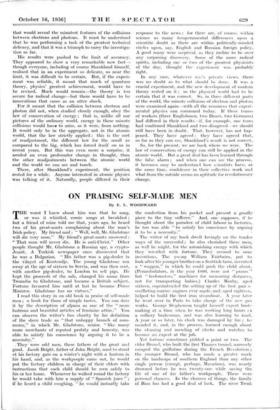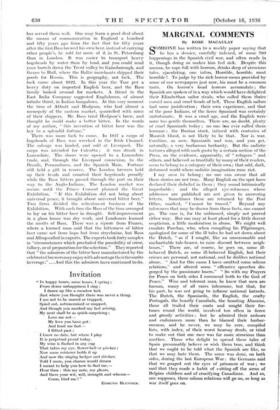ON PRAISING SELF-MADE MEN
By E. L. WOODWARD THE worst I knew about him was that he sang, , or was it whistled, comic songs at breakfast ; but a friend of mine told me that, years ago, he heard two of his great-aunts complaining about the man's Irish policy. My friend said : "Well, well, Mr. Gladstone will die very soon." My friend's great-aunts answered : "That man will never die. He is anti-Christ." Other people thought Mr. Gladstone a Russian spy, a crypto- Jesuit, , A Turkish newspaper once discovered that he was a Bulgarian. "His father was a pig-dealer in the yilayet of Kustendje. The young Gladstone ran away at the .age ,of sixteen to Servia, and was then sent, with another pig-dealer, to London to sell pigs. He kept the proceeds of the sale, changed his name from Trozadin to Gladstone, and became a British subject. Fortune . favoured him until at last he became Prime Minister. Gladstone has no virtues."
I read this story in an old book in praise of self-made men; a book for those of simple tastes. You can date it by the description of alpaca as one of the "more lustrous and beautiful articles of feminine attire." You can observe the writer's fine charity by his definition of ;the slave trade as "that unhappy branch of com- merce," in which Mr. Gladstone, senior, "like many more. merchants of reputed probity and honesty, was able. to satisfy his conscience by arguing it to be a necessity."
. They were odd men, these fathers of the great and good. Jacob Bright, father of John Bright, used to stand at his factory gate on a winter's night with a lantern in his hand, and, as the workpeople came out, he would put the factory children in charge: of their, elders with instructions that each child should be seen safely to his or her home. Whenever he walked round the factory he would take with him a supply of "Spanish juice " ; if he heard a child coughing, "he would instantly take the confection from his pocket and present a goodly piece to the tiny sufferer." And, one supposes, if be thought about the paradox of child labour in factories, he too was able "to satisfy his conscience by arguing it to be a necessity."
The writer of my book dwelt lovingly on the tender ways of the successful ; he also cherished these men, as well he might, for the astonishing energy with which they wrestled with fortune. They seemed to ooze inventions. The young William Fairbairn, put to look after his younger brother on a Scottish farm, invented a " waggon," in which lie could push the child about. (Perambulators, in the year 1800, were not " prams " but " hodometers," machines for measuring distances, not for transporting babies.) Charles Manby, aged sixteen, superintended the setting up of the first pair o oscillating marine engines ever made, and, aged eighteen, helped to build the first iron steamboat. year later he went over to Paris to take charge of the new gas works. George Stephenson taught himself expert boot- making at a time when he was working long hours rs a colliery brakesman, and was also learning to read. A year or so later, his clock was damaged by fire ; he mended it, and, in the process, learned enough, about the cleaning and mending of 'clocks and watches, to become an expert at the job.
Yet fortune sometimes yielded a point or two. The elder Brunel, who built the first Thames tunnel, narrowly escaped the guillotine during the French Revolution ; the younger Brunel, who has made a greater mark on the landscape of southern England than any other single person (except, perhaps, Macadam), was nearly drowned before be was twenty-one while saving the life of one of his father's workpeople. These were personal chances. In the chances of things, the family of ,Pass has had a good deal of luck. The river Trent has served them well. One may learn a good deal about the means of communication in England a hundred and fifty years ago from the fact that for fifty years after the first-Bass brewed his own beer, instead of carr■iing other people's, he sold far more of it in St. Petersburg than in London. It was easier to transport heavy hogsheads by water than by land, and you could send your barrels down the Trent valley to Gainsborough, and thence to Hull, where the Baltic merchants shipped their goods for Russia. This is - geography, not luck. .The luck came about 1822. In this year the Tsar put a- heavy duty on imported English beer, and the.. Bass family looked around- for markets. A . friend - in the East India" Company suggested Englishmen, of almbst infinite thirst, in Indian bungalows. At this very moment the lirni of -Abbott and. Hodgson, Who- had almost a monopoly of the eastern market, -quarrelled With some of their shippers. Mr. Bass tried Hodgson's brew, and thought he could make a better bitter. In the words: of my author, " this invention of bitter beer, was the: key to 4 splendid fortune."
• There, was more luck to - come. . In. 1827 a cargo of hogsheads, of -Bass was wrecked in the Irish. Channel. The salvage was landed, and sold at Liverpool. The cargo was intended for Calcutta ; it was drunk in Lancashire. The doors were opened to a Lancashire: trade, and, through the Liverpool connexion, to, the Brazils, Pernambuco, and the Spanish Main. Fortune still held a gift in reserve. The London brewers held: up their heads and counted their . hogsheads proudly - while the Bass bitters passed through the port on. their way to the Anglo-Indians. The London market was secure until the Prince Consort planned the Great Exhibition. " If this Exhibition did not bring about universal -peace, it brought about universal bitter beer." Two firms divided the refreshment business of the Exhibition. With each firm the Bass of the time arranged to lay on his bitter beer iii draught. Self-improvement in a glass house was dry wOrk, and Londoners learned- the merits of Bass. There was a riposte from. France, where a learned man _said that the bitterness of bitter beer came not from hops but from strychnine, but Bass and Allsop called in experts. The experts took forty samples in "circumstances which precluded the possibility of error, - fallacy, or of preparation for the selection." They reported - that "the admirers of the bitter beer manufactured by the celebrated brewers may enjoy with advantage their favourite beverage." ... And this the admirers have continued to do.





















































 Previous page
Previous page